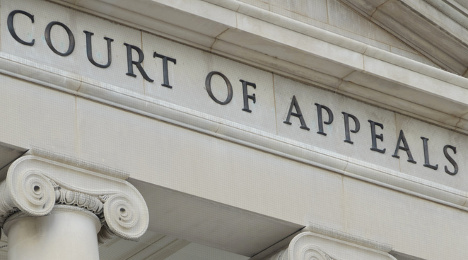13 industry groups & DOJ file briefs in CFPB constitutionality case

Photo from Shutterstock.com
By subscribing, you agree to receive communications from Auto Remarketing and our partners in accordance with our Privacy Policy. We may share your information with select partners and sponsors who may contact you about their products and services. You may unsubscribe at any time.
WASHINGTON, D.C. –
The parade of legal developments leading toward the U.S. Court of Appeals for the District of Columbia Circuit rehearing an important case involving the Consumer Financial Protection Bureau has started in earnest.
First, the American Financial Services Association, along with a dozen other organizations, delivered an amicus brief — a legal document filed in appellate court cases by non-litigants with a strong interest in the subject matter. AFSA joined other organizations that have involvement in auto finance such as the American Bankers Association (ABA), the Consumer Bankers Association (CBA) and the Credit Union National Association (CUNA), as well as the Financial Services Roundtable (FSR).
The entire matter stems from a case in which the initial decision reached last October called the CFPB “unconstitutionally structured.” The case pit the regulator against PHH Corp., a Mount Laurel, N.J.-based finance company that operates in the mortgage space.
It involved a three-judge panel of the court, which ruled the CFPB’s structure was constitutionally flawed and that its director, who currently is Richard Cordray, should be removable at the will of the president.
As AFSA shared through its weekly Newsbriefs, the case deals with Corday’s order from June 2015 asserting that PHH violated the Real Estate Settlement Procedures Act (RESPA). The CFPB asked for the rehearing after a panel of judges ruled that the CFPB’s structure of a single director who can only be removed by cause is unconstitutional.
The rehearing will intensify further when oral arguments before the en banc court will be heard on May 24. AFSA and its fellow industry organization looked to make clear their issues with the CFPB’s actions and what the court should do next.
Subscribe to Auto Remarketing to stay informed and stay ahead.
By subscribing, you agree to receive communications from Auto Remarketing and our partners in accordance with our Privacy Policy. We may share your information with select partners and sponsors who may contact you about their products and services. You may unsubscribe at any time.
“In abruptly departing from the plain language of the statute, the bureau’s own regulations and longstanding guidance for industry, the order exceeded the bureau’s authority and violated fundamental tenets of administrative law and fair notice. The order also raises the troubling specter of further changes without notice, deeply unsettling a market built on predicable legal rules,” the organizations said in their amicus brief, which is available here.
Meanwhile, last Friday, the U.S. Department of Justice filed its own amicus brief, referencing a 1935 case that determined the president has “Article II authority to supervise, direct and remove at will subordinate (principal) officers in the executive branch in order to exercise his vested power and duty to faithfully execute the laws.” The specific matter — Humphrey’s Executor vs. United States — involved how Congress could forbid removing members of the Federal Trade Commission except for cause.
Then, the Justice Department made its connection to this matter involving the CFPB.
“The principal constitutional question in this case is whether the exception to the president’s removal authority recognized in Humphrey’s Executor should be extended by this court beyond multi-member regulatory commissions to an agency headed by a single director,” DOJ officials said in its amicus brief obtained and posted online by Hudson Cook.
“While we do not agree with all of the reasoning in the panel’s opinion, the United States agrees with the panel’s conclusion that single-headed agencies are meaningfully different from the type of multi-member regulatory commission addressed in Humphrey’s Executor,” they continued. “The Supreme Court’s analysis in Humphrey’s Executor was premised on the nature of the FTC as a continuing deliberative body, composed of several members with staggered terms to maintain institutional expertise and promote a measure of stability that would not be immediately undermined by political vicissitudes. A single-headed agency, of course, lacks those critical structural attributes that have been thought to justify ‘independent’ status for multi-member regulatory commissions.
“Moreover, because a single agency head is unchecked by the constraints of group decision making among members appointed by different presidents, there is a greater risk that an ‘independent’ agency headed by a single person will engage in extreme departures from the president’s executive policy,” the Justice Department went on to say. “And as the panel recognized, while multi-member regulatory commissions sharing the characteristics of the FTC discussed in Humphrey’s Executor have existed for over a century, limitations on the President’s authority to remove a single agency head are a recent development to which the executive branch has consistently objected."
The Justice Department closed its summary with a request for the U.S. Court of Appeals for the District of Columbia Circuit.
“We therefore urge the court to decline to extend the exception recognized in Humphrey’s Executor in this case. In addition, in our view, the panel correctly applied severability principles and therefore properly struck down only the for-cause removal restrictions,” DOJ officials said.


